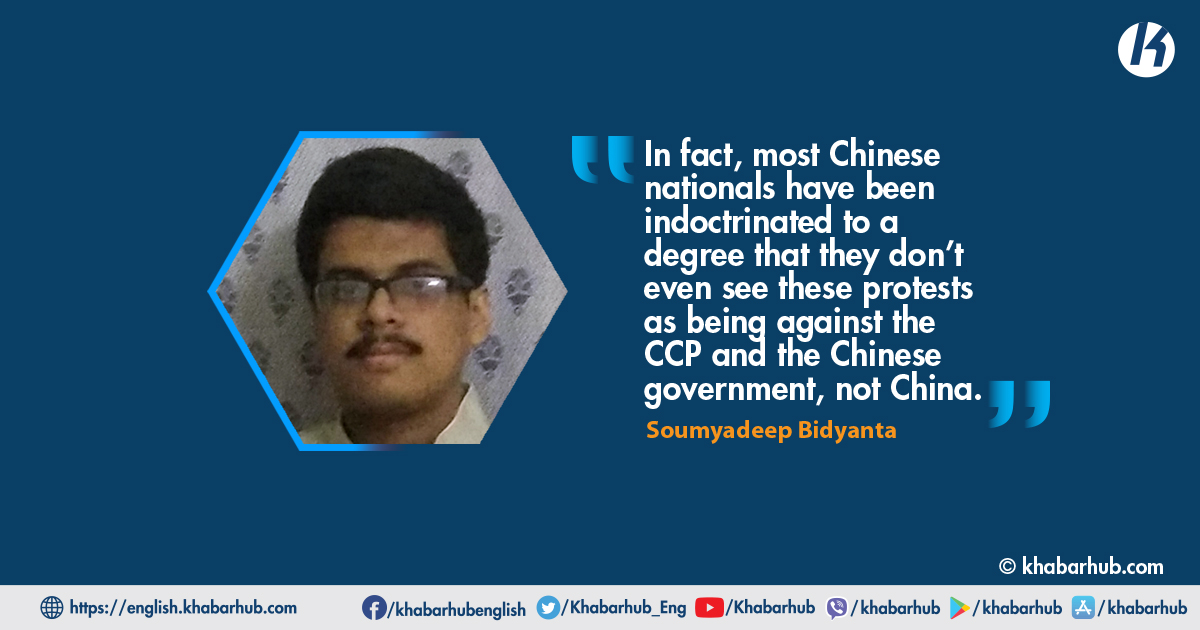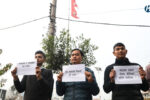No one is unfamiliar with the repression of the Chinese state in Xinjiang, Tibet and Hong Kong. In Xinjiang, there have been reports that the Chinese government has been keeping religious and ethnic minorities in concentration camps, and using them for forced labor.
In Tibet, the Chinese have brought about a demographic change and repressed any attempts at Tibetan autonomy or Independence.
In Hong Kong, pro-democracy protests have been violently repressed, with leaders jailed and sent to the mainland. People around the world have condemned the Chinese government for its human rights abuses and have petitioned and staged demonstrations asking for their governments to take concrete action against China.
In recent years, China has faced much ridicule for its perceived overreaction against foreign private citizens protesting in their own way against China’s repression of its citizens.
China has often made statements condemning such protests, or even gone on to register complaints to the concerned foreign government.
The question that needs to be asked is, why does China behave in this way? Why does China care if some British university students stage a demonstration in London against the Chinese government, or some Danish newspaper draws a cartoon ridiculing China?
It is unlikely that such demonstrations or cartoons would have any effect at all, and yet the Chinese government without fail registers an official protest totally out of proportion to the perceived “offense”. The most common explanation is that the Chinese state is extremely sensitive and cannot handle criticism.
The Chinese government, through the façade of appearing to be offended, is placating the protestors and shielding themselves from any further meaningful action.
This “thin-skinned” approach by China has been ridiculed by the Western public, who feel accomplished by essentially doing nothing meaningful against the Chinese government.
This is a very short-sighted appraisal of the issue, and the disproportionate Chinese response is not caused by sensitivity but is a deliberate strategy.
The argument is, however, speculative as concrete evidence cannot be offered for the same. However, it is logical, and once understood, makes a lot of sense.
The ultimate Chinese aim is to prevent concrete action to be taken against them. This concrete action would come in the form of sanctions and boycotts which would hurt China economically.
It also needs to be kept in mind that most states also don’t want to take any such action against China, since such action would most likely hurt the sanctioning country more than China itself.
This was proven in the trade war between China and the US during Donald Trump’s presidency: while the trade war did hurt China, economists have indicated that it was more harmful to the United States itself.
Thus, a great charade is played out in front of the world, which goes something like this – People in the West conduct harmless protests against the Chinese government, China acts like it has been extremely offended by the actions of the said people, and the people feel accomplished by their actions.
Western civil society protests, China appears offended, protestors feel accomplished, and we can all enjoy Globalism. Who suffers? Probably the ones in Xinjiang, Tibet, and Hong Kong. But no one was perhaps ever genuinely concerned about them, to begin with.
The day China fails to register a protest or issue a statement indicating that their sensitivities have been hurt, that would be the day the people in the West put more pressure on their governments to take more concrete action against China.
The Chinese government, through the façade of appearing to be offended, is placating the protestors and shielding themselves from any further meaningful action.
The term “slacktivism” is often used for such low-effort ways to protest. While this is not exactly a phenomenon of slacktivism (since many protests are often quite serious and do involve action on the ground, as opposed to being online-only), the overall effect is much the same.
China really doesn’t care if there is an art exhibition or a lecture against Chinese atrocities and repression in the US or Europe. However, through this great act of appearing offended, China can convince that such protests do work, and that the protestors are accomplishing something.
China has very tight control over the domestic dissemination of information, and there is no chance that such protests abroad would inspire opposition against the government within China.
In fact, most Chinese nationals have been indoctrinated to a degree that they don’t even see these protests as being against the CCP and the Chinese government, not China. As such, they feel that they themselves are targets of these protests, and many vehemently defend their government online.
Would this change in the future? Would people ultimately find out that China really doesn’t care about any such protests, and the only meaningful and concrete actions would be economic boycott and sanctions? Probably not.
For one needs to remember that it is not only China that benefits from these economic relations, but countries in the West too.
A boycott of China would mean that universities would no longer be able to milk Chinese students for expensive international tuitions, or multinational corporations be able to manufacture their products cheaply in China.
People in the West are all too aware that any concrete actions would be painful for them too, and thus they too collude in this great charade.
Western civil society protests, China appears offended, protestors feel accomplished, and we can all enjoy Globalism. Who suffers? Probably the ones in Xinjiang, Tibet, and Hong Kong. But no one was perhaps ever genuinely concerned about them, to begin with.
(Soumyadeep Bidyanta is an MA graduate of the School of International Studies, Jawaharlal Nehru University, New Delhi)









Comment